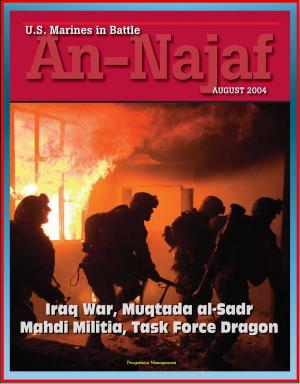Understanding the Complexity of Reconciliation, Reintegration and Amnesty for the Enemy in Counterinsurgency Warfare: Vietnam, Dhofar, COIN, Petraeus, Iraq War Surge, Afghanistan, Taliban, Al Qaeda
Nonfiction, History, Military| Author: | Progressive Management | ISBN: | 9781311324641 |
| Publisher: | Progressive Management | Publication: | October 30, 2014 |
| Imprint: | Smashwords Edition | Language: | English |
| Author: | Progressive Management |
| ISBN: | 9781311324641 |
| Publisher: | Progressive Management |
| Publication: | October 30, 2014 |
| Imprint: | Smashwords Edition |
| Language: | English |
This thesis argues for reconciliation, reintegration and amnesty as the primary means to assure a long term peace. This recognition may cause the U.S. to better prepare a comprehensive strategy for future insurgencies. Fundamentally, reconciliation is cheaper because the aggregate cost of security and conventional operations that rely on vast amounts of resources do little over the long term to change the will of the insurgent. The cost of reconciling with insurgents, disarming, reintegrating, training and possibly moving them and their families is lower than the cost of security forces and their operations over the long run. This thesis argues that reconciliation and reintegration is an essential strategy to achieving a long term nation at peace. The end state is a nation at peace with itself and its neighbors and has a vibrant inclusive political system that preempts violent conflict, reconciliation, and reintegration is the essential strategy to achieve it.
The current challenges for the military within the reconciliation framework are that the military must understand the environmental conditions for reconciliation to work. Military and civilian leaders must understand reconciliation, reintegration and amnesty principles and reinforce principles at the tactical level consistently to achieve long term goals. Military and political leaders must work together closely to maintain flexibility to adjust to changing political landscape, but still maintain stability of the overall political system. The reconciliation phase is difficult and there are many lessons learned. The current system of education does not address key challenges to ensure consistent military support in all areas geographically or from the tactical to operational level.
ACRONYMS * CHAPTER 1 * INTRODUCTION AND THE ROLE OF HISTORY * Why Reconcile? * CHAPTER 2 * REVIEW OF EXISTING LITERATURE AND RESEARCH METHODOLOGY * Classical Insurgency and Counterinsurgency * CHAPTER 3 * THEORY AND DOCTRINE - DESCRIBING THE CURRENT RECONCILIATION AND REINTEGRATION LENS * Department of State Disarmament, Demobilization and Reintegration * The Importance of Doctrine, Planning, Supporting Reconciliation and Reintegration and the Military Leader * United Nations Doctrine * British Doctrine * Security * Reconciliation is a host nation led initiative * Political and Military Will * Governments develop joint agency plans that is resourced, coordinated and comprehensive * Start the Reconciliation, Reintegration in Conflict process early * CHAPTER 4 * VIETNAM * Case Study Vietnam 1963-1974 * Chieu Hoi * CHAPTER 5 * DHOFAR * Case Study Dhofar 1965-1975 * CHAPTER 6 * CONTEMPORARY OPERATING ENVIRONMENT (COP) * Case Study Iraq 2004-2010 * Al Anbar and Initial Reintegration in Iraq from 2006 * Case Study Afghanistan 2003-2010 * Cultural Tradition of Reintegration * Current Afghan Pakistan (AFPAK) Strategies * International Security and Assistance Force (ISAF) Reintegration Currently * CHAPTER 7 * CONCLUSION * APPENDIX A * RESEARCH PROTOCOL * APPENDIX B * RESEARCH QUESTIONS * APPENDIX C * PARTICIPATION CONSENT
This thesis argues for reconciliation, reintegration and amnesty as the primary means to assure a long term peace. This recognition may cause the U.S. to better prepare a comprehensive strategy for future insurgencies. Fundamentally, reconciliation is cheaper because the aggregate cost of security and conventional operations that rely on vast amounts of resources do little over the long term to change the will of the insurgent. The cost of reconciling with insurgents, disarming, reintegrating, training and possibly moving them and their families is lower than the cost of security forces and their operations over the long run. This thesis argues that reconciliation and reintegration is an essential strategy to achieving a long term nation at peace. The end state is a nation at peace with itself and its neighbors and has a vibrant inclusive political system that preempts violent conflict, reconciliation, and reintegration is the essential strategy to achieve it.
The current challenges for the military within the reconciliation framework are that the military must understand the environmental conditions for reconciliation to work. Military and civilian leaders must understand reconciliation, reintegration and amnesty principles and reinforce principles at the tactical level consistently to achieve long term goals. Military and political leaders must work together closely to maintain flexibility to adjust to changing political landscape, but still maintain stability of the overall political system. The reconciliation phase is difficult and there are many lessons learned. The current system of education does not address key challenges to ensure consistent military support in all areas geographically or from the tactical to operational level.
ACRONYMS * CHAPTER 1 * INTRODUCTION AND THE ROLE OF HISTORY * Why Reconcile? * CHAPTER 2 * REVIEW OF EXISTING LITERATURE AND RESEARCH METHODOLOGY * Classical Insurgency and Counterinsurgency * CHAPTER 3 * THEORY AND DOCTRINE - DESCRIBING THE CURRENT RECONCILIATION AND REINTEGRATION LENS * Department of State Disarmament, Demobilization and Reintegration * The Importance of Doctrine, Planning, Supporting Reconciliation and Reintegration and the Military Leader * United Nations Doctrine * British Doctrine * Security * Reconciliation is a host nation led initiative * Political and Military Will * Governments develop joint agency plans that is resourced, coordinated and comprehensive * Start the Reconciliation, Reintegration in Conflict process early * CHAPTER 4 * VIETNAM * Case Study Vietnam 1963-1974 * Chieu Hoi * CHAPTER 5 * DHOFAR * Case Study Dhofar 1965-1975 * CHAPTER 6 * CONTEMPORARY OPERATING ENVIRONMENT (COP) * Case Study Iraq 2004-2010 * Al Anbar and Initial Reintegration in Iraq from 2006 * Case Study Afghanistan 2003-2010 * Cultural Tradition of Reintegration * Current Afghan Pakistan (AFPAK) Strategies * International Security and Assistance Force (ISAF) Reintegration Currently * CHAPTER 7 * CONCLUSION * APPENDIX A * RESEARCH PROTOCOL * APPENDIX B * RESEARCH QUESTIONS * APPENDIX C * PARTICIPATION CONSENT















